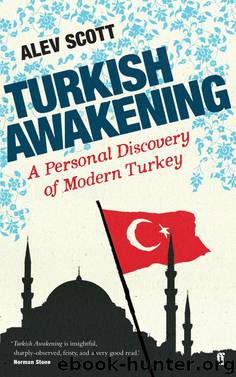Turkish Awakening by Alev Scott

Author:Alev Scott [Alev Scott]
Language: eng
Format: epub
ISBN: 9780571296590
Publisher: Faber & Faber
Published: 2014-03-06T05:00:00+00:00
8
The Dickensian Model
Turkey is a developing country – which is easy to forget when you’re living in the cosmopolitan buzz of Istanbul – and it needs to concentrate its resources on building up its economy. That is not done by arts and crafts and individuality but by big industry, banking and construction. Turkish schooling is utilitarian. It prioritises useful, science-based subjects over useless arty subjects and is characterised by box-ticking examinations: ends-based, mechanical and deeply unattractive. There is so much creativity in Turkey, and it is almost always directed towards moneymaking. Many other countries could be charged with the same crime, but I have never before seen it so institutionalised as in Turkey. There is a tendency here to concentrate on the big picture in both business and schooling – overambitious returns on minimum investment, maximum marks from the most efficient cramming. This utilitarian ‘big picture’, while rewarding for the economy, is incredibly short-sighted for society as a whole.
Governmental and municipal neglect of the supposedly superfluous concerns of the arts and the environment, among other things, has a sense of impending tragedy about it – what will be the point of a flourishing economy when Turkey’s landscape is entirely marred by ugly architecture and rubbish-strewn countryside? Who wants to live in a country thronged with houses expensively but hideously furnished, where people watch glossy soap operas on television, and theatres and libraries stand empty? I taught at a university in Istanbul and saw the products of the Turkish schooling system – grade A, uninspired and uninspiring students; I marched in the Gezi protests and saw these students transformed by a cause – courageous, creative and excited by the future, they were shining examples of what young people should be. The creative output of the protests was astonishing: strangers composed song lyrics together on the streets at night, dancers performed in Gezi Park and people of all ages and backgrounds scrawled poetic graffiti and cartoons on walls and roads everywhere. The contrast made me realise the tragedy of unfulfilled potential in Turkey, and why it is frustrating that a rapidly modernising country is held back by stuffy, outdated institutions and a lack of trust in non-mainstream sectors.
I wanted to work out what fuels the Turkish obsession with volume, repetition and uniformity. Turks are, traditionally, great believers in safety in numbers. If asked where they would live in a perfect world, most would probably answer: ‘In a site.’ A site (from the French cité) is a characterless gated community, with identical apartments, security guards and a token patch of garden within high walls. Pre-installed on all televisions within the apartments is a direct link to the building’s security-camera screens. It is very telling that Turks are generally less concerned with where they live and more concerned with the building in which they live – provided, of course, that the neighbourhood is respectable (which is to say, full of similar sites). Apparently, people feel safer in the environment of a site, but what exactly they feel safe from was a mystery to me for some time.
Download
This site does not store any files on its server. We only index and link to content provided by other sites. Please contact the content providers to delete copyright contents if any and email us, we'll remove relevant links or contents immediately.
| Africa | Americas |
| Arctic & Antarctica | Asia |
| Australia & Oceania | Europe |
| Middle East | Russia |
| United States | World |
| Ancient Civilizations | Military |
| Historical Study & Educational Resources |
Empire of the Sikhs by Patwant Singh(23086)
The Wind in My Hair by Masih Alinejad(5095)
Rise and Kill First by Ronen Bergman(4789)
The Templars by Dan Jones(4689)
The Rape of Nanking by Iris Chang(4213)
12 Strong by Doug Stanton(3550)
Blood and Sand by Alex Von Tunzelmann(3205)
Babylon's Ark by Lawrence Anthony(2679)
The History of Jihad: From Muhammad to ISIS by Spencer Robert(2629)
No Room for Small Dreams by Shimon Peres(2368)
The Turkish Psychedelic Explosion by Daniel Spicer(2358)
Inside the Middle East by Avi Melamed(2357)
Gideon's Spies: The Secret History of the Mossad by Gordon Thomas(2353)
Arabs by Eugene Rogan(2299)
The First Muslim The Story of Muhammad by Lesley Hazleton(2271)
Come, Tell Me How You Live by Mallowan Agatha Christie(2260)
Bus on Jaffa Road by Mike Kelly(2160)
1453 by Roger Crowley(2031)
Kabul 1841-42: Battle Story by Edmund Yorke(2029)
